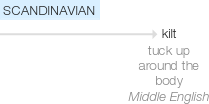Kilt
Middle English (as a verb in the sense ‘tuck up around the body’): of Scandinavian origin; compare with Danish kilte (op) ‘tuck (up)’ and Old Norse kilting ‘a skirt’. The noun dates from the mid 18th century.
wiktionary
From Middle English kilten(“to tuck up, gird”), apparently of North Germanic origin, ultimately from Old Norse kelta, kjalta(“skirt; lap”). Perhaps from Proto-Germanic *kelt-, *kelþǭ, *kilþį̄(“womb”), from Proto-Indo-European *gelt-(“round body; child”). [1] Cognate with Danish kilte(“to tuck”), Swedish kilta(“to swathe”). Related to English child.
kill + -t
etymonline
kilt (n.)
"plaited tartan skirt," originally the part of the belted plaid which hung below the waist, c. 1730, quelt, from Middle English verb kilten "to tuck up" (mid-14c.), from a Scandinavian source (compare Danish kilte op "to tuck up;" Old Norse kilting "shirt," kjalta "fold made by gathering up to the knees").
kilt (v.)
"to tuck up," mid-14c., surviving in Scottish, a word of Scandinavian origin (compare Danish kilte "to truss, to tuck up," Swedish kilta "swaddle"); see kilt (n.). Related: Kilted; kilting.
